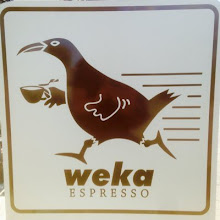 As I thumb through one of my newest baking acquisitions, Gran's Sweet Pantry by Natalie Oldfield, I think about how far we've come. This is a whole recipe book of family secrets! People will laugh when I tell them how excited I was to successfully make hot water sponge, the most basic of baking recipes that everyone knows how to make but I'd never made before; it's simply not been part of my baking culture and I didn't know where to begin.
As I thumb through one of my newest baking acquisitions, Gran's Sweet Pantry by Natalie Oldfield, I think about how far we've come. This is a whole recipe book of family secrets! People will laugh when I tell them how excited I was to successfully make hot water sponge, the most basic of baking recipes that everyone knows how to make but I'd never made before; it's simply not been part of my baking culture and I didn't know where to begin.I grew up in an Italian community where food was integral to every celebration and event. Sharing a meal was (and still is) an expression of caring and love. Everyone had their specialty dishes and these were largely regional. From a very young age, I knew to ask who had made what and could taste the difference in technique or when someone had varied an ingredient.
Under no circumstances would someone ever share a recipe. If they did (5% chance), there would be a seriously incorrect quantity somewhere in the ingredients list and/or a couple of missing (or completely wrong) steps in the method. That's just how it was. My mother tells the story of the HUGE pavlova made with twelve egg whites; she should've realised she would never have been given the actual recipe, as requested of a family friend. To acquire someone's treasured recipe was an unlikely as being given a key to their house and permission to wander in any time day or night.
 Back in the 80s, our primary school decided to put together a collaborative recipe book as a fundraising activity. With a culture so steeped in good food, they wondered why there were so few contributions from this usually forthcoming community. That's because we were all under strict instructions to not give away any family recipes! The recipes we kids were allowed to contribute were pretty generic; you could probably find them anywhere and they mean very little all these years later.
Back in the 80s, our primary school decided to put together a collaborative recipe book as a fundraising activity. With a culture so steeped in good food, they wondered why there were so few contributions from this usually forthcoming community. That's because we were all under strict instructions to not give away any family recipes! The recipes we kids were allowed to contribute were pretty generic; you could probably find them anywhere and they mean very little all these years later.In this digital age, it's not only easier to find others' recipes but also to contribute to the wider baking and foodie communities. There are whole websites dedicated to sharing recipes, not to mention blogs, YouTube, Pinterest, hashtags on Twitter, Tumblr and online communities. Bakeries publish the very recipes they make and sell to customers. Some even hold classes teaching the public their tricks of the trade. While they may risk losing sales, they're actually increasing their overall profile and building up an appreciation of their product. Like making croissants and macarons, there are some things I'd rather leave to the experts (and pay good money for) now that I know just what is involved in the process. However, I have learned so much from others and my baking has improved in ways that wouldn't have been possible without people so generously sharing their knowledge.
I'm really glad that the culture of bakers is changing. This continuous process of evolution and sharing can only benefit the future of foodies and those we cook for. However, to have the recipe is one thing; to master it is another ... but that's where practice makes it all so much fun.

No comments:
Post a Comment